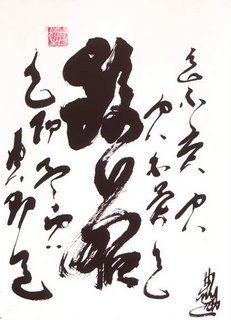 Avalokitesvara Bodhisattva
Avalokitesvara Bodhisattvawhen practicing deeply the Prajna Paramita perceives that all five skandhas are empty
and is saved from all suffering and distress.
Shariputra, form does not differ from emptiness, emptiness does not differ from form. That which is form is emptiness, that which is emptiness form.
The same is true of feelings, perceptions, impulses, consciousness.
Shariputra, all dharmas are marked with emptiness; they do not appear or disappear, are not tainted or pure, do not increase or decrease.
Therefore, in emptiness no form, no feelings, perceptions, impulses, consciousness.
No eyes, no ears, no nose, no tongue, no body, no mind ;no color, no sound, no smell, no taste, no touch, no object of mind; no realm of eyes and so forth until no realm of mind, consciousness.
No ignorance and also no extinction of it, and so forth until no old age and death and also no extinction of them.
No suffering, no origination,no stopping, no path, no cognition, also no attainment with nothing to attain.
The Bodhisattva depends on Prajna Paramita and the mind is no hindrance; without any hindrance no fears exist. Far apart from every perverted view one dwells in Nirvana.
In the three worlds all Buddhas depend on Prajna Paramita and attain Anuttara Samyak Sambodhi.
Therefore know that Prajna Paramita is the great transcendent mantra, is the great bright mantra, is the utmost mantra, is the supreme mantra which is able to relieve all suffering and is true, not false. So proclaim the Prajna Paramita mantra, proclaim the mantra which says:
gate gate paragate parasamgate bodhi svaha gate gate paragate parasamgate bodhi svaha gate gate paragate parasamgate bodhi svaha.
The above is the translation of the Heart Sutra of the Kwam Um School of Zen, a Korean school to which the sangha to which I belong had ties in the past. It may not be the best translation of the sutra, but it is the one to which I have become accustomed.
Zen differs from most religions, including most other schools of Buddhism, in that it really has no sacred texts [In fact I don't consider my Buddhism a religion at all but a practice, but that's another matter.] That is, we certainly admit that the sutras (and there may an exception or two; my Buddhist scholarship is certainly amateur) were written down after Gautama Siddhartha, the historical Buddha, died, and are prone to human error. In fact many of them are really fantastical and it's hard for me to believe that Gautama had anything to do with them. However, Zen and many schools of Mahayana Buddhism accept the Heart Sutra as the core truth at the heart of Buddhism.
I'm not really qualified to give any kind of explication of the Heart Sutra; like any other great truth, it speaks for itself (in translation). It's just that my ruminations on the discussion of life and death in the past few blogs keep bringing me back to it. "The mind is no hindrance; without any hindrance, no fears exist." It just strikes me that those who are afraid to die are afraid to live. The same people I know who would keep a disabled individual on life support in a coma for thirty years, are afraid to drive their cars in the snow. Go figure.
But once dying is accepted as a part of living, it is nothing to fear. My assumption is that when I die, my life will cease. If all these people are so convinced that upon their deaths, their souls will go to Heaven or to Nirvana or whatever, or that they will be reborn in a better existence due their persistence in making themselves subservient to a deity of their own making, why are they so afraid to die?
We tend to think the samurai were all screwed up. And of course like the American cowboy they are not what they are all cracked up to be, but that's not the point. Yeah, it's a little nuts to shove a sword into your gut because you may have displeased someone (of course it helps when there's a guy standing behind you to chop your head off so you don't feel any pain). On the other hand, it's a noble concept to end your life with honor and intent, no matter what the snivellers says. It's very liberating to begin each day with the knowledge that you might die that day, and the intent to make it the best possible day you could have for the last one. I enjoy my life and intend to keep doing it for a while. But it's mine.
1 comment:
Reminds me of that Klingon proverb, how did it go? "It is a good day to die." (?) (cuz, you know, everything I ever needed to know, I learned from Star Trek).
Anyway, you were asking on my blog for some html help, and I didn't know how to respond (tried yahoo and a response on my blog) so here I am. I'd be happy to try and give you a hand, feel free to contact me at awmyhr at gmail dot com...
Post a Comment